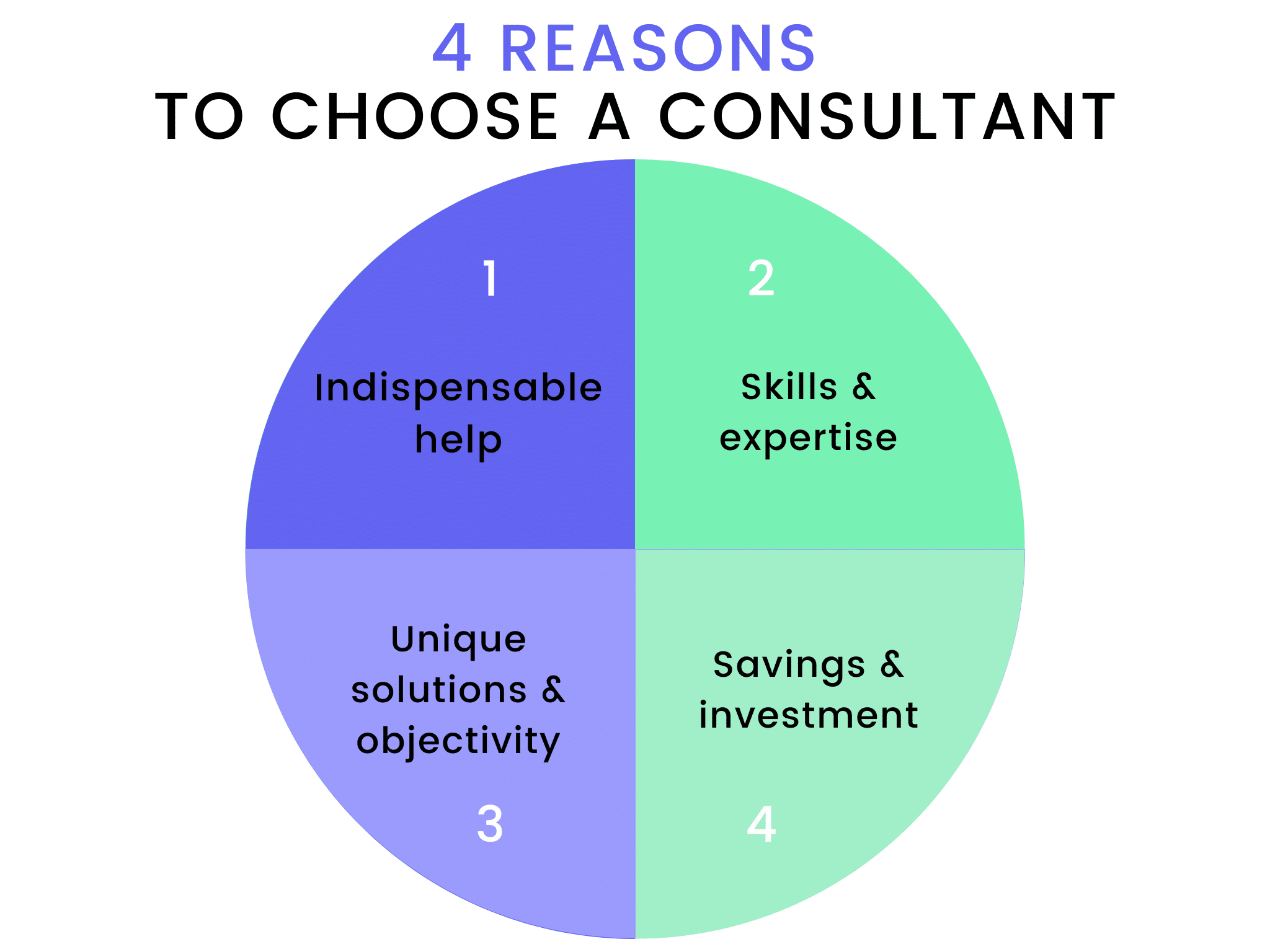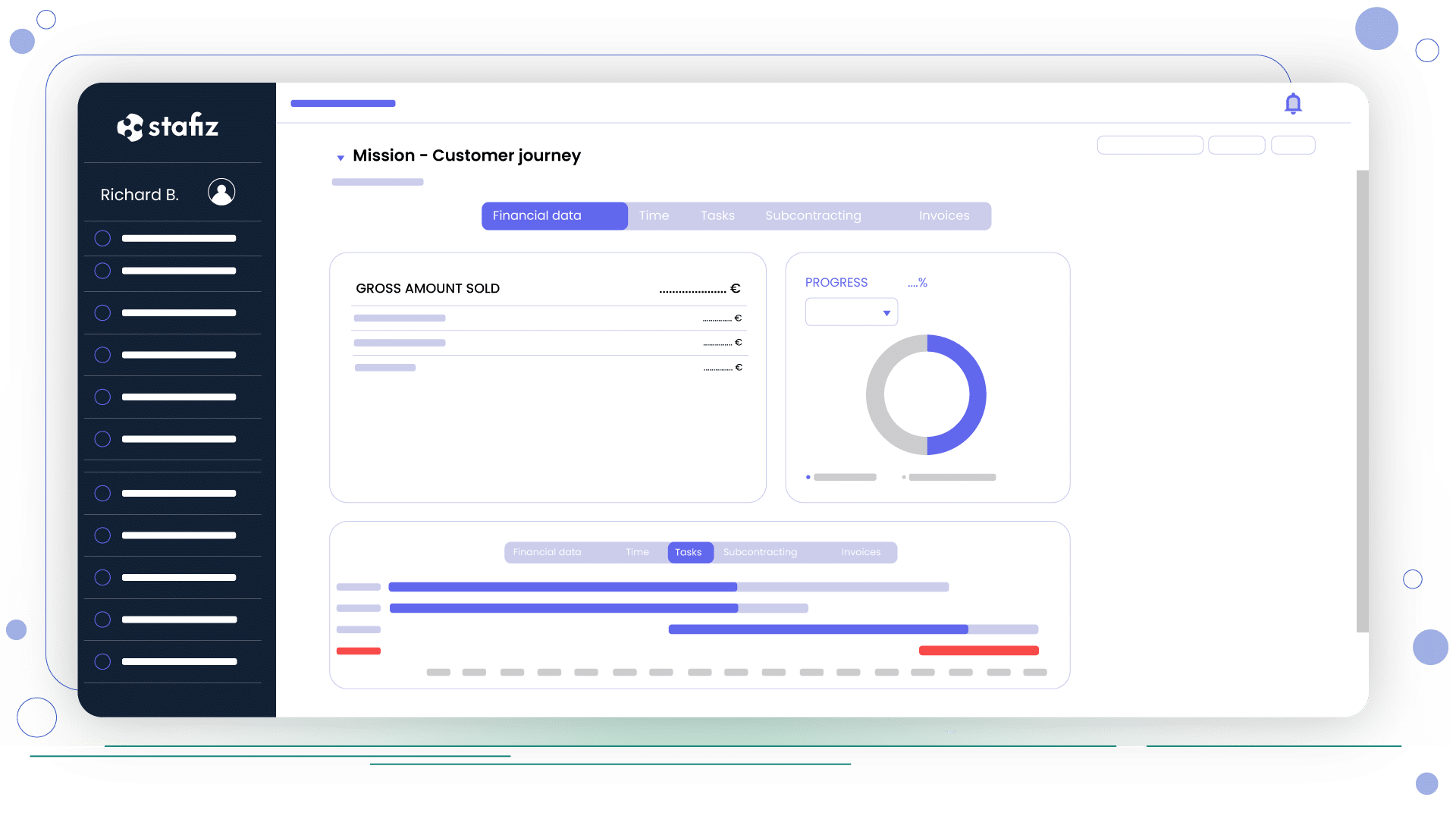7 reasons to hire a consultant

The hiring of consultants is sometimes controversial. Are you a large company, an SME, or a very small business? Or a start-up? You've come to the right place. And you are probably asking yourself these questions:
- Why should consultants know the company better than we do?
- How can they deliver value in just a few weeks?
You're wondering if hiring consultants will help your company, right? You should know that studies carried out over the last ten years have proven that management consultants improve the performance of a company. We will study the World Bank and Stanford study of 2012 later. Note also that consulting firms have perfectly embraced the digital revolution and have reinvented themselves. Their consultants are just waiting for a call from you!
Are you facing these problems?
- You don't have time to complete certain tasks or assignments in your company
- You don't have the resources
- Your employees don't have the expertise they are looking for and you can't train them (for various reasons)
You surely need a consultant! But what can it do for you?

Advantage 1: Indispensable help
You need this consultant. No one in your company can accomplish the mission you have in mind. It can be a lack of time or skill. Or you don't have the right resources. The consultant can take care of tasks that are burdensome for you and your employees. This will lighten their load and yours, your employees will have less pressure on their shoulders.
Advantage 2: Expertise
Indeed, the consultant represents a certain expertise in one or more fields. He has the experience, knowledge, and abilities to accomplish what you need. The consultant also has the advantage of knowing your competitors well, having certainly worked with them before. He also has a good vision of the new market trends in your business. This person will be able to provide you with good advice and guide you towards an effective and innovative strategy, regardless of the purpose of the mission. ERP software is an essential project management tool that can help you identify the consultant who will have the appropriate expertise for your assignments.
Advantage 3: New solutions thanks to an external perspective
His view – in addition to being experienced – is external to your company, therefore much more objective. The consultant thus has no personal interest and can remain impartial in his decisions. It will give you another perspective and help you achieve the goals you set with an approach you may not have thought of.

Stafiz is a resource planning that allows you to manage your employees and subcontractors with simplicity and efficiency. With a complete view of the candidates' profiles and their skills, find the best person for your projects!
Advantage 4: You will save money!
A consultant can be expensive. But it is still a good investment for the company despite everything. Firstly, you will not have as many costs as if you recruited employees with these skills (overheads, costs related to equipment, leave, insurance, etc.).
Secondly, the consultant is very efficient and can complete an assignment quickly. You will only have to pay for it for a limited time. You will save time on these tasks, as training employees can be time-consuming. However, you can consider hiring a consultant to train them on a long-term basis if you wish.
Finally, you may be eligible for state aid to co-finance the hiring of a consultant. More information here
How do you demonstrate with facts and figures that a consulting project offers the expected value?
It's not always easy. An experiment conducted by a Stanford professor for a World Bank study in 2012 provides some interesting findings. The aim of the study was to answer the following question:
- Can management practices explain differences in productivity, especially in countries where the performance gap is particularly large?
To investigate, the Stanford team organized a field experiment.
Medium-sized Indian textile companies were selected. They were offered a free 5-month management consulting project with Accenture to change the processes of their factories. The results were compared to a set of similar Indian companies that have not changed their factory processes.
–> The results are indisputable : companies that followed the consultants' recommendations improved their productivity by 10%. But also the quality of the products and the management of stocks. They have managed to speed up production.
Is it only in India, you may ask? Well, the same professor had worked on a similar study with two researchers at the LSE and gathered data from around the world. The results were similar.

How can management consultants stay relevant in a world that is changing at such a pace?
Let's take a closer look at the four main advisory functions of information, expertise, intuition and execution. It is very clear that management consulting firms have taken drastic steps to maintain their competitive edge.
Let's take a look at each of these functions and understand how consulting firms adapt to each one:
Information:
- All the expertise that Accenture or other consulting firms bring to their clients comes from the sheer amount of data they've collected over the thousands of projects they've completed.
- Nowadays, access to a large volume of data has become much easier. Historical data from a single consulting firm is less valuable. How do consultants reinvent themselves to remain the information gurus they used to be?
- Many consulting firms have set up in-house data science teams in order to take advantage of the abundance of data available.
- McKinsey hires experienced data engineers. They help the teams on the ground.
- BCG has established a BCG Gamma team for data science. Because even though finding data has become much easier, it is now difficult to calculate it intelligently to be able to provide the right recommendations.
Expertise
- Most consulting firms prefer to hire generalists rather than experts. Larger consulting firms hire MBAs who can work on a supply chain project one month, and on a pricing project the next.
- However, they have developed an extensive network of experts who join the team whenever a project requires it. Leveraging this network is very powerful to provide better insights to enterprise customers.
- Every consulting firm should strive to expand its network of independent consultants.
Insight
- There is always hope of a financial return when a company hires consultants. The information provided by the consultants is expected to generate significant or net improvements.
- The increase in shareholder value has always justified the high project fees charged by consulting firms. BCG's famous growth sharing matrix has been called the "$1 million framework." It provided information so useful that it justified a fee of $1 million for such a project.
- With the growing number of strategy books and the rise of business schools, classic strategic analysis has become more accessible.
- But the most important insights from consulting firms are now centered around their vision for industry changes and what companies should be doing to increase their competitive advantage rather than simply providing a strategic framework.
Execution
- This is an area where consulting firms began to adapt a long time ago. The consultants have always offered to help implement the strategy they have defined.
- But the gap between insight and execution is wider now than it was a few decades ago. The execution of the strategy has indeed become more and more technical. And the world is becoming more and more digital.
- For example: if the strategy recommends "developing an e-commerce website and increasing search engine optimization (SEO)." Or to "create a cross-platform analytical tool to predict customer demand". The client company may not have adequate internal resources. Nor the resources to execute this strategy.
- This is where good consulting firms can help. Only if they have internal resources or in partnership with the appropriate experts.
A consultant is flexible, adapts and responds to the needs of his clients. It works quickly and efficiently and will be a real added value for your business. What matters to him: your satisfaction. If the collaboration between you is correct and fluid, you have the advantage of having this consultant in reserve for other missions.
With a resource planning, you can collaborate even better with them, and integrate them into your team. The project management tool will allow you to successfully manage your subcontracting and track performance indicators in real time.
To learn more about the Stafiz platform, request a demo.

